A Japanese research team discovered that proanthocyanidins, the main compound found in grape seeds, promote hair growth stimulaton by switching follicles from te resting to the active phase.
Benefits
✓ Prevents hair loss
✓ Stimulates hair regrowth
✓ Restores Frizzy Hair
Growth Recipe?
Yes (See Below)
Our Pick
NOW USDA Organic Grapeseed Oil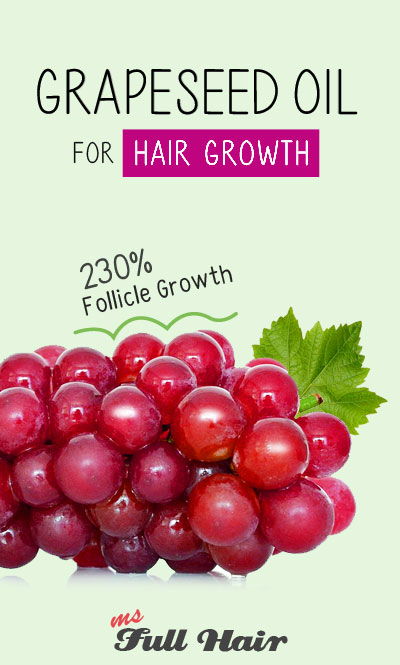
It turns out that using grapeseed oil for hair growth is actually not a bad idea after all – a number of studies confirm!
In this review article, you will learn the benefits of using grapeseed oil for hair growth as well as its general uses for hair and skin.
We will also reveal several studies that show amazing results in using grapeseed for hair loss (Click here to go straight to the studies).
Finally, you’ll learn how to find the best grapeseed oil for hair and the top 3 recommendations based on specific criteria.
Let’s get to it:
What is grapeseed oil?
As expected, grapeseed oil is extracted from the seeds of grapes.
This popular cooking / carrier oil is rich in omega 6 fatty acids (linoleic acid – 70%) followed by omega 9 (oleic acid 16%).
The high content of linoleic acid makes grapeseed oil an excellent option for nourishing the scalp and hair strands without weight it down.
Grapeseed oil also contains vitamin E, a powerful antioxidant that keeps your cells healthy.
Grapeseed oil is widely used for variety of culinary uses from cooking oil to salad dressing. Its beauty use, specifically for skin and hair care, is equally popular thanks to the rich linoleic acid content.
Grapeseed oil vs grape seed extract
One of the most frequently asked questions: Is grapeseed oil and grapeseed extract the same?
The short answer: Yes and no
While both grapeseed oil and grape seed extract come from the seeds of grapes, the extraction / manufacturing process as well as their compositions are quite different.
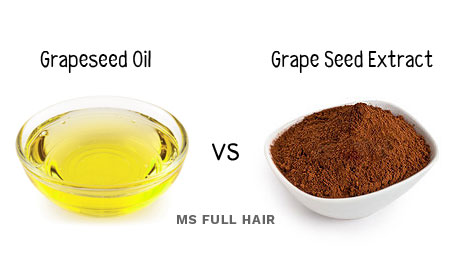
What’s the same?
Both grapeseed oil and grapeseed extract contain vitamin E and polyphenols (such as proanthocyanidins) with the latter (grape seed extract) having a higher amount.
What’s the difference?
Processing methods: Grapeseed oil is processed from seeds of variety of common grapes by using either cold or expeller pressed methods or a solvent extraction method. Both cold and expeller methods use heat to squeeze out the essence, while the solvent pressing uses chemicals such as hexane to get the liquid out.
Grapeseed extract often uses a steam distillation process to extract polyphenols (the main compound of grape seeds), which then gets purified into either a power or liquid form.
Different uses: Another difference between grapeseed oil and grapeseed extract is how people use it, especially when it comes to stimulating hair growth.
In general, people use grapeseed oil for dietary consumption or topical application for beauty uses (skin and hair care), while grapeseed extract comes in the form of supplements in most cases.
If you are using it for hair:
Grapeseed oil: People use grape seed oil as a topical carrier oil for moisturizing and nourishing hair strands, preventing dandruff and itchy scalp, cleansing clogged pores, and promoting hair growth (which is often combined with essential oils).
Grape seed extract: Grapeseed extract often comes as supplements with the main active ingredient of proanthocyanidins, which is known for providing multiple health benefits as well as stimulating hair growth.
Check out our hair loss success story about a guy who had a great hair growth result with grapeseed extract supplement.
NOTE: Don’t get confused between grapeseed extract and “grapefruit” seed extract, especially when you are buying supplements. Both use the same initials / acronym of GSE which adds to the confusion.
Grapeseed extract is from “grape” seeds, while grapefruit seed extract are extracted from “grapefruit” seeds.
They are completely different!
Grapeseed oil benefits for hair and skin
Culinary applications are only one form of grapeseed oil uses. Grapeseed oil is also popular carrier oil for hair and skin care.
Grapeseed oil benefits for hair, skin and face:
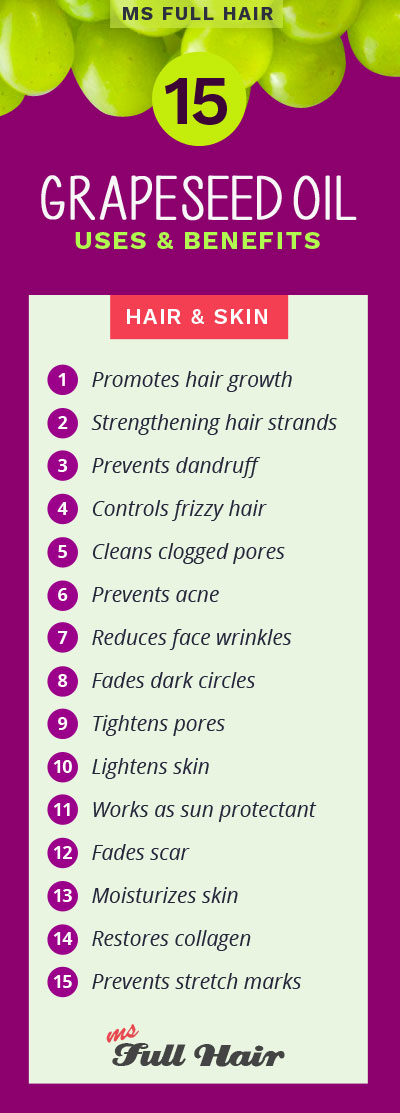
- Nourishes damaged and dyed hair strands
- Promotes hair growth (when used with essential oils)
- Prevents hair loss (by inhibiting DHT activities to follicles)
- Strengthens hair strands
- Prevents dandruff
- Controls frizzy hair
- Cleans clogged pores
- Prevents acne
- Fades dark circles
- Tightens pores
- Lightens skin
- Works as sun / heat protectant
- Reduces face wrinkles
- Fades scars
- Moisturizes skin
- Restores collagen
- Prevents stretch marks
6 Powerful benefits of grapeseed oil for hair growth
Is grapeseed oil good for hair growth? Yes, grapeseed oil is rich in antioxidants and its high linoleic acid content makes excellent carrier oil for hydrating dried and itchy scalp by balancing natural oleic acid found on our skin. It also helps encourage hair growth when you use it with essential oils such as cedarwood oil and lavender oil.
Here are a number of benefits of grapeseed oil for hair growth in detail:
#1 Grapeseed oil extract stimulates new hair growth
Japanese researchers discovered that grape seed extract gives impressive hair growth results after extensive research on over 1000 extracts from roots, leaves and seeds of numerous plants!
Not only did they find grapeseed extract promotes follicle proliferation, but it also converts telogen follicles (resting and falling stage) into active growth (See study #1 for detailed explanation).
#2 Grapeseed oil’s fatty acids can be used as a natural DHT blocker
Research (1) shows the importance of certain fatty acids when it comes to inhibiting 5a reductase and it turns out that grapeseed oil includes two of these fatty acids (70% linoleic acid and 16% oleic acid)!
The 5 alpha reductase enzyme is responsible for converting testosterone into dihydrotestosterone (DHT), which in turn causes female and male pattern hair loss, also known as androgenic alopecia. (See study #2 for detailed explanation)
Another study (2) shows successful results on using linoleic acid for reversing alopecia and scalp dermatitis on a patient for topical use. While the study used safflower oil, which contains 60-70% of linoleic acid, grapeseed oil also contains an equivalently high amount of linoleic acid.
#3 Grapeseed oil may regrow hair on people with alopecia areata
In a study involving alopecia areata patients, grapeseed carrier oil was one of the ingredients the researchers selected to treat autoimmune disease symptoms (where your own immune system attacks hair follicles and interfere with normal hair growth). See study #2 below for detail.
#4 Grapeseed oil is antioxidants
Grapeseed oil contains vitamin E (more than olive oil) which provides great antioxidant benefits. The role of antioxidants is crucial in the body because it controls the activities of free radicals from damaging our cells and causing immune diseases that can be associated with hair loss.
Antioxidants protect various pathways to ensure healthy hair follicle growth.
#5 Grapeseed oil can prevent dandruff hair loss
A research shows, grapeseed oil has antimicrobial and anti-inflammatory properties which are essential for controlling dandruff and its premature hair loss issues due to scalp inflammation.
In order to make a hair oil mix to get rid of dandruff, mix tea tree oil (a powerful essential oil especially for dandruff prevention) and grapeseed oil in 15 drops to 2 tsp ratio and apply onto the scalp 2-3 times a week.
#6 Grape seed oil soothes scalp irritation
If you have scalp eczema or scalp psoriasis or similar type of inflammatory reactions, grapseed oil can help with such irritation, thus preventing hair loss.
A study (4) finds that polyunsaturated fatty acids (70% of grape seed oil) act as an “inflammatory mediator.”
The researchers tested grapeseed oil along with sesame and fenugreek oils for its wound healing properties on mice.
The result shows the oil mix promoted the “the best tissue regeneration” compared to the control group, thanks to its natural antibacterial and antioxdiant properties.
Studies on using grapeseed oil for hair growth
Here are a number of hair loss studies we found using grape seed oil or its rich compounds (such as linoleic acid and vitamin E) used for the purpose of promoting hair growth.
Study 1 Encouraging hair follicle cell proliferation and extending the growth phase… using grape seeds!
A Japanese research team (5) dug through 1000+ extracts to find out the THE ultimate one (or a few) that stimulate serious hair growth and they ended up with one.
And as you’ve guessed it by now, the one was grape seeds.
The researchers found out that proanthocyanidins, the main compound of grape seeds, was what drove the stimulation of new hair follicles, which was 230% MORE than the control group.
When tested on mice, they also discovered that proanthocyanidins have the incredible ability of switching hair follicles from the telogen phase (hair resting stage) to the anagen stage (hair growth stage).
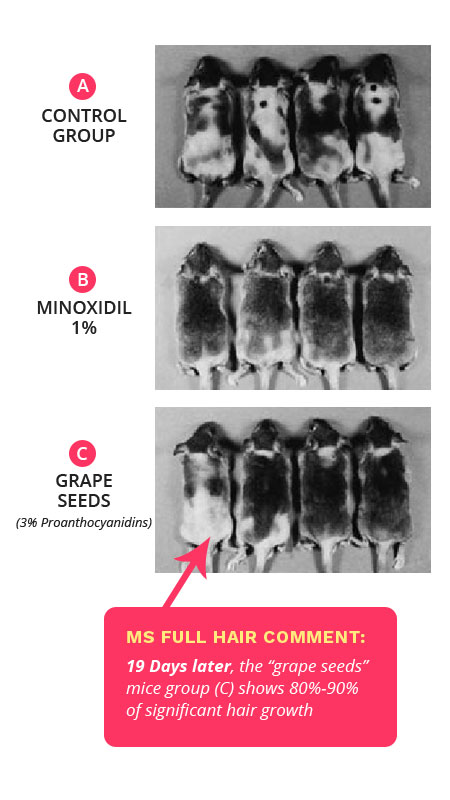
What’s the takeaway?
Proanthocyanidins, found in grape seeds, can be used as a natural treatment for stimulating hair regrowth and stabilizing hair follicles to stay in the anagen phase a longer period of time (thus more hair).
Also note that the amount of proanthocyanidins is much higher in grapeseed extract than in grapeseed oil. So taking a grape seed extract supplement can be a great option to consider.
Study 2 Inhibiting 5 alpha reductase, enzyme known for causing hair loss
A 1992 study finds that certain unsaturated fatty acids have the ability to stop hair loss caused by DHT hair miniaturization (dihydrotestosterone).
The researchers found that these fatty acids block the 5a reductase enzyme from converting testosterone into DHT.
So what are those fatty acids? Gamma linoelic acid, alpha linolenic acid, linoleic acid, oleic acid, and finally myristoleic acid.
If you remember from the beginning, almost 90% of grapeseed oil is made out of linoleic acid and oleic acid!
What’s the take away?
While the research team finds that gamma linoelic acid as the most active compound for blocking DHT, it’s important to note that linoleic acid and oleic acid, abundantly found in grapeseed oil, also played a role in this.
Study 3 Grapeseed oil in hair growth oil mix for stimulating hair regrowth
Another study (6) showcases the powerful properties of using certain essential and carrier oils for stimulating new hair growth.
The study involved participants suffering from alopecia areata (aka patchy hair loss on scalp).
The first group (half of the participants) was given a hair oil mix that contains essential oils (rosemary, lavender, thyme and cedarwood) and carrier oils (grapeseed oil and jojoba oil) to be applied topically.
The other group (the second half) was given carriers oils (grapeseed oil and jojoba oil).
The result shows significant improvements on the first group who used the essential and carrier oil mix (44% of the participants).The other group (treated with carrier oils only) still showed improvements in 17% of participants.
What’s the takeaway?
Using grapeseed oil (as well as jojoba oil) as a carrier oil has some effects on stopping hair loss and encouraging hair growth. However, the regrowth benefit seems to increase drastically when you mix with essential oils.
If you want to follow this study formula to reverse your thinning hair, use this recipe.
Study 4 New hair growth with vitamin E, found in grapeseed oil
A 2010 study (7) published in Tropical Life Sciences Research finds that people with hair loss generally show the lower levels of antioxidants on the scalp.
The study was conducted to find out the effectiveness of Tocotrienol supplementation in relation to hair loss.
Tocotrienol is from vitamin E family known for its antioxidant property. Also, vitamin E is found in grapeseed carrier oil.
The study involved 38 participants.
The researchers gave the first group 100 mg of Tocotrienols to be taken orally, while a placebo supplement was given to the other group (control group).
The researchers measured the progress in month 4 and month 8
The result? 34.5% HAIR INCREASE compared to 0.1% DECREASE in the control group. That’s pretty significant!
What’s the takeaway?
Vitamin E’s antioxidant properties appear to play a crucial role in promoting healthy hair growth as well as promoting new hair follicle growth.
Side effects
Dietary consumption: When it comes to consumption, there is a lot of controversy on whether grapeseed oil is healthy or not. To be fair, a number of studies show grape oil’s multiple health benefits from lowering overall cholesterol levels to improving cardiovascular health.
However, too much consumption (maximum 5-7 tablespoons) of grapeseed oil could have reverse effects on cholesterol, weight gain, as well as imbalance of hormones.
Topical use: Grapeseed oil is likely to be very safe when used topically, especially for skin and hair treatment. But if you have allergic reactions with grapes, do NOT use grapeseed oil.
How to find the best grapeseed oil for hair loss
What to look for: Check the processing method.
Make sure the grapeseed oil is hexane-free. Grapeseed oils that don’t mention anything about its extraction process on the label are likely to use the solvent pressed method, thus containing some amount of chemicals.
Even though the amount of chemicals may not be significant, it’s still a good idea to go for the pure version which uses either expeller-pressed or cold-pressed extraction methods to get the essence out from grape seeds.
Grapeseed oils that are expeller and cold pressed are usually highlighted on the label, so it’s pretty easy to spot (and even better go for USDA organic like this one).
Where to buy grape seed oil for hair:
If you are not too concerned with the type of extraction method, you can easily find grapeseed oil from any grocery store.
If you are looking for pure grapeseed oil using the cold pressed method (the most preferred way), Amazon has the most options, which is actually the case for almost all essential and carrier oils you can think of for the use of skin and hair care.
TOP 3: What’s the best grapeseed oil for hair growth?
Is there any good grapeseed oil brand for hair? Here are 3 best quality grape oil for the use of promoting hair growth.
Beauty Aura Pure Grapeseed Oil
Very affordable, plus it’s 100% pure
Beauty Aura offers very affordable pure grapeseed oil and it comes in 16 oz bottle! This will last you for a LONG time.
This 100% pure grapeseed oil is hexane-free and extracted by using the cold pressed method (which is the most preferred way to get the active compounds of grape seeds, plus it’s hexane free).
Now Grapeseed oil
It’s USDA Organic!
Now grapeseed oil is in fact one of the few grapeseed oils we found that are USDA organic certified. This grape seed oil also uses a cold-pressed extraction method and the brand is, as you know, very consistent in providing high quality essential and carrier oils.
Sky Organics Grape seed oil
Go for sold rating
Sky Organics is another brand with great reputation when it comes to providing the quality oils for hair and skin care.In fact, this specific oil has over 700 reviews with SOLID 4.5-star rating!
This 100% pure grape seed oil is also made from the cold-pressed method, thus no additives or chemicals in the formula.
How to use grapeseed oil for hair – 2 Amazing recipes
Recipe 1 For stimulating new hair follicle growth and stopping hair loss
Ingredients
- 1 tsp of castor oil
- 1 tsp of grapeseed oil
- 7 drops of lavender essential oil
- 7 drops of peppermint essential oil
Directions
- Mix them well in a dropper bottle
- Directly apply onto the scalp
- Leave it for 2 hours or overnight
- Wash it well
How often?
For the maximum growth benefit, use it 5 times a week, preferably with a derma roller to increase blood circulation on the scalp
Recipe 2 For getting rid of dandruff and moisturizing scalp and hair strands
Ingredients
- 5 drops of tea tree essential oil
- 2 tsp of cold-pressed grapeseed oil (for its purity without any hexane or chemical residue)
Directions
- Mix the ingredients into a bottle
- Apply onto the scalp and hair strands
- Leave the tea tree and grapeseed oil for hair overnight
- Wash it well in the morning
How often?
Use the hair oil mix 3 times a week.
Frequently asked Q&A
Grapeseed vs olive oil for hair
Grapeseed oil is lighter and has less flavor than olive oil. Olive oil (especially extra virgin olive oil) has full grassy flavor and has deep and rich yellow color.
When it comes to hair, both grapeseed oil and olive oil make great carrier oils for hair growth. Grapeseed oil has higher vitamin E content than olive oil, which provides an antioxidant property and ensures a safe environment for hair follicle cells to grow.
Olive oil stimulates various hair growth factors and induces follicles to stay in the anagen phase for a longer period of time. Grapeseed oil’s linoelic acid fatty acid can inhibit 5a-reductase from turning testosterone to DHT according to a study.
Grapeseed oil vs jojoba oil for hair
Unrefined and cold-pressed jojoba oil has richer color and more aroma than grapeseed oil.
When it comes to using it for hair, you can’t go wrong with either grapeseed oil or jojoba oil. Grapeseed oil is lighter and its high linoelic acid content provides a protective layer to sooth and nourish scalp and hair.
Jojoba oil has somewhat similar structure to human sebum and is used in numerous beauty products, thanks to its emollient property. Also jojoba oil is a popular carrier oil often used in hair growth research.
Can I leave grapeseed oil for hair overnight?
Yes, you can apply grapeseed oil only onto the entire head over night or mix with other carrier or essential oils depending on your use (for hair growth, see recipe #1, for nourishing anti-inflammatory mask see our recipe #2).
Final takeaway
Can I use grapeseed oil for hair growth?
Grapeseed oil makes excellent carrier oil for the topical hair use, thanks to linoelic acid for hydrating and possibly DHT blocking properties according to a study.
It also contains antioxidant and antimicrobial agents – great for reducing the risk of scalp inflammation.
Make sure to buy expeller pressed or even better, cold pressed grapeseed oil. The last thing you want is the chemical residue hanging on the scalp.
Also consider using it with essential oils (see our recipe #1) in order to increase its effectiveness for stimulating hair growth and stopping hair loss.
Finally, if you are going for a consumption route for the sake of hair growth benefits, consider grape seed extract instead such as this, which contains the HIGH amount of proanthocyanidins.
Have you used grapeseed oil for your hair? How was your experience? We would love to hear your personal experience!


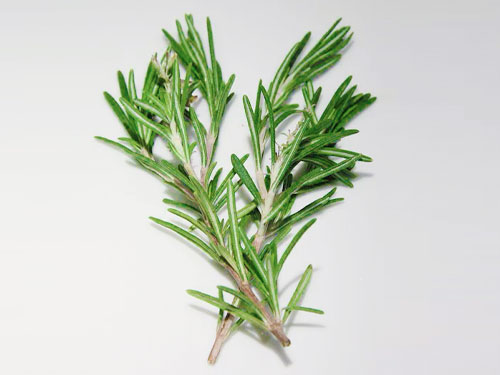
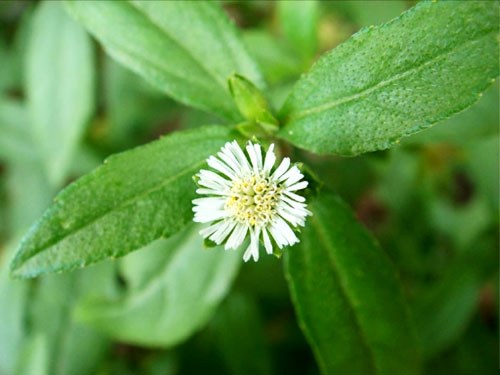
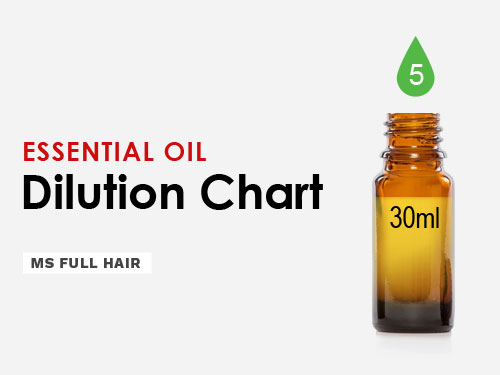
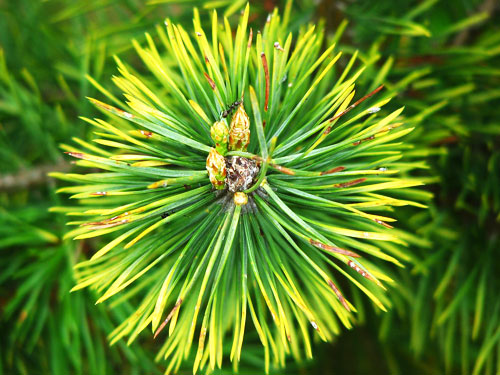

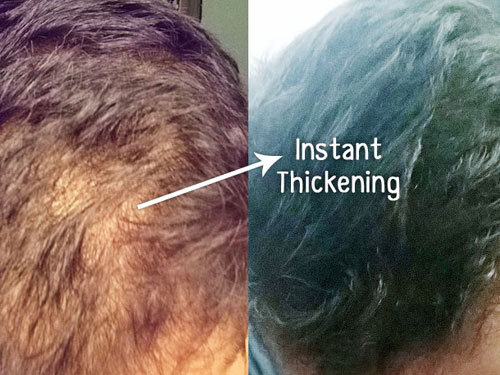

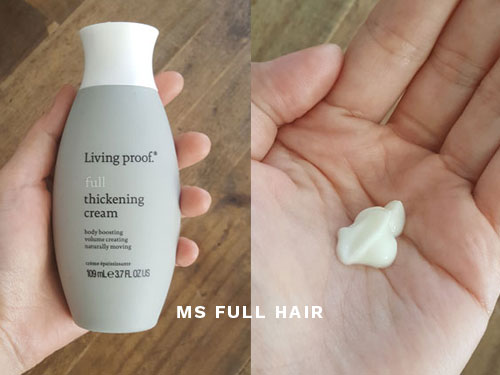
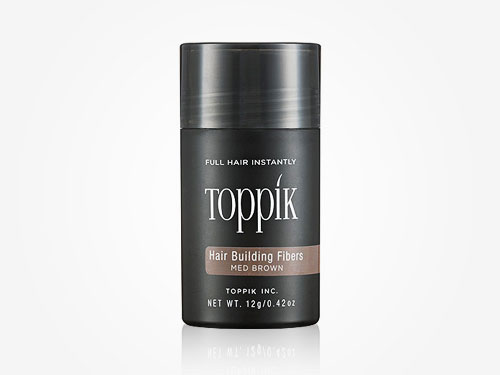
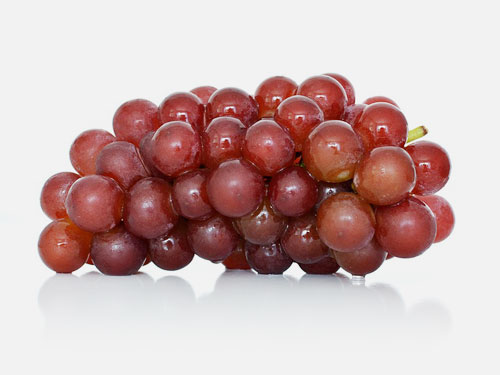
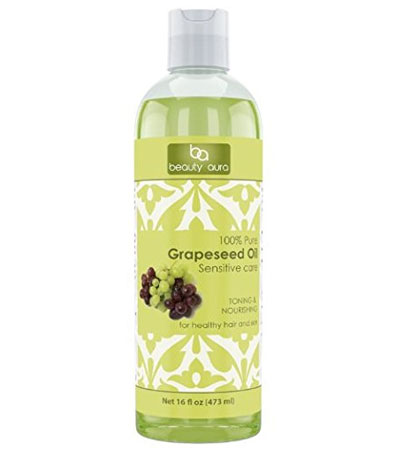
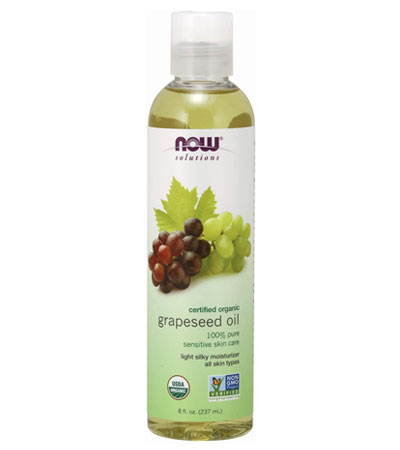
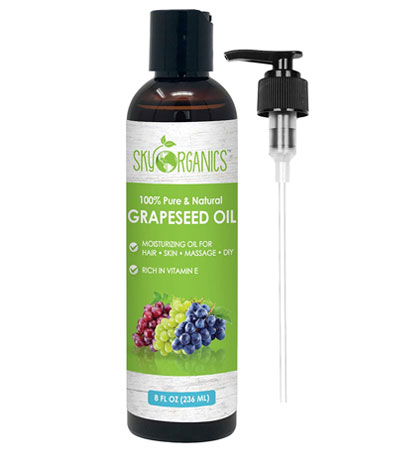


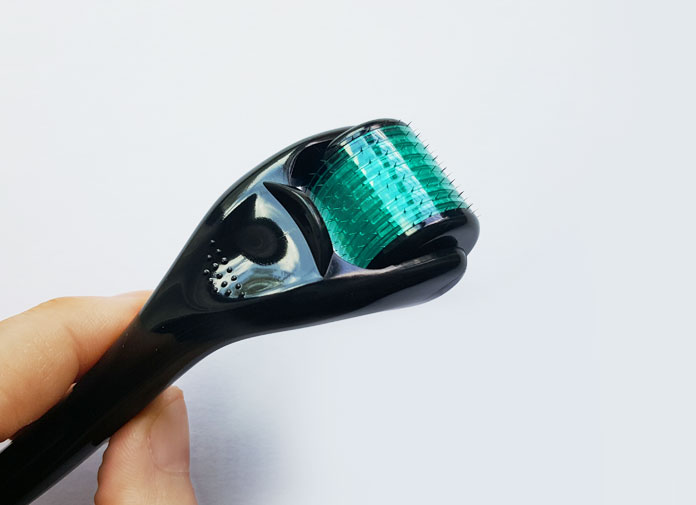
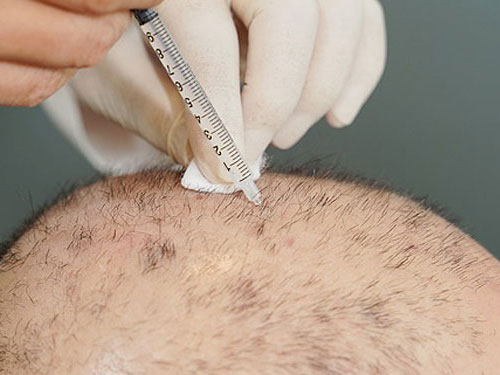
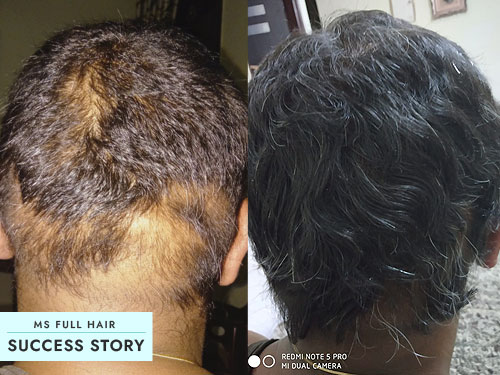
Hello,
In the recipe, it is written:
2 tsp of cold-pressed grape seed oil
how much ml is 1 tsp?
Thanks,
Zow
Is this recipe mild enough for babies